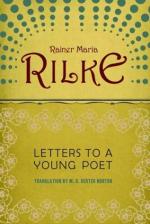
|
| Name: _________________________ | Period: ___________________ |
This test consists of 15 multiple choice questions and 5 short answer questions.
Multiple Choice Questions
1. Why has it taken so long for Rilke to reply to the young poet with his seventh letter?
(a) Rilke had forgotten about the letter.
(b) Rilke had left the letter in a different city.
(c) Rilke had been ill.
(d) Rilke had been traveling.
2. In what manner does Rilke say one must be when one is sad?
(a) Lonely and attentive.
(b) Angry and vocal.
(c) Dutiful and silent.
(d) Solitary and depressed.
3. At the close of letter seven, what love does Rilke tell the young poet to remember?
(a) The love of his parents.
(b) The love of his first experience of solitude.
(c) The love of Rilke.
(d) The love of nature.
4. Why does Rilke delay so long in replying to the young poet's fifth letter?
(a) Rilke has been ill.
(b) Rilke leaves the young poet's letter in another city.
(c) The young poet's fifth letter has angered Rilke.
(d) Rilke does not like to write letters when he is traveling.
5. To what does Rilke compare people who are preparing for God?
(a) Roses.
(b) Fools.
(c) Bees.
(d) Poems.
6. In letter five, to where does Rilke say he is preparing to move?
(a) A beach house on the southern coast.
(b) The city center.
(c) A hotel.
(d) A summer house in a rural area away from the city.
7. What is the young poet's military rank?
(a) Soldier.
(b) General.
(c) Doctor.
(d) Officer.
8. According to Rilke in letter eight, where does destiny originate?
(a) From external events.
(b) With God.
(c) From within individuals.
(d) With thought.
9. What does Rilke say is "the only courage demanded of us"?
(a) The courage to be prepared for the unknown or unexpected.
(b) The courage o be solitary.
(c) The courage to love.
(d) The courage to create.
10. Who resists the future change in women that Rilke notes in letter seven?
(a) Militaries.
(b) The Church.
(c) Men.
(d) Philosophers.
11. To what does Rilke compare humans' misunderstanding of destiny in letter eight?
(a) Humans' misunderstanding of love.
(b) Humans' previous misunderstanding of the motion of the sun.
(c) Humans' misunderstanding of human nature.
(d) Humans' misunderstanding of God.
12. In what year is the seventh letter written?
(a) 1912.
(b) 1904.
(c) 1908.
(d) 1903.
13. Rilke says that as time passes, women will stop doing what?
(a) Falling in love.
(b) Being oppressed.
(c) Having children.
(d) Imitating men.
14. What does Rilke advise the young poet to do if he cannot connect with people?
(a) Identify with nature, animals, and children.
(b) Read more books.
(c) Learn an instrument.
(d) Develop his sense of empathy.
15. How long has Rilke been in the city from which he writes the fifth letter?
(a) Six weeks.
(b) Six days.
(c) Two months.
(d) Two weeks.
Short Answer Questions
1. In letter five, what statue does Rilke mention is near his place of residence?
2. What does Rilke tell the young poet to ask himself regarding his religious beliefs?
3. What type of sadness does Rilke call "dangerous"?
4. In letter eight, what does Rilke tell the young poet he must be careful with?
5. What does Rilke encourage the young poet to believe about God?
|
This section contains 566 words (approx. 2 pages at 300 words per page) |

|




